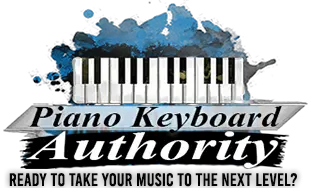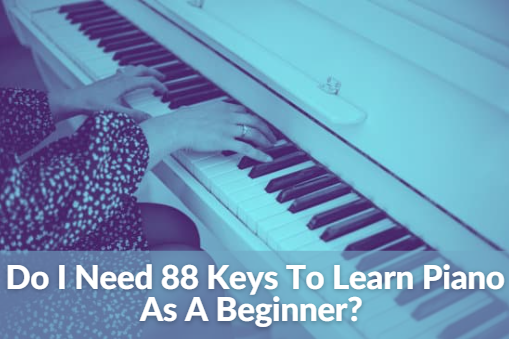Well… do we need 88 keys to learn piano? The truth is, practicing on a full-size keyboard will help you develop both your technique and your musicality. If you play on a smaller keyboard, it’s harder to do that. Now the question is do I really need 88 keys when learning piano? For most people, it doesn’t matter. You probably do need a full-size keyboard if you want to be a good player. But there are exceptions in some areas of music where it might not matter as much.
Table of Contents
When do I need 88 keys when learning piano?
I used to think that I couldn’t use my left hand effectively unless I played keyboards with more than 61 keys. Then I started studying jazz piano. I was surprised to find that even some very good jazz pianists do not have 88-key keyboards. How do they do it?
The truth is, up until about the 1960s or so, most pianos had only 61 keys. These days some models have more than 88 keys, but you can still get standard upright pianos with 61 keys. Plus there are many digital pianos that are non-weighted and do not feel like a real piano at all.
So do you really need 88 keys when learning piano?
The bottom line is this: do not worry about the number of keys you have if you’re just starting out. To be honest, it doesn’t matter that much. What matters most is having a proper setup and practicing properly. You can learn to play in even the smallest rooms or studios with only one-floor pedal.
Can I play all songs on a 61 key keyboard?
The truth is, do I need 88 keys when learning piano? You can play any song on a standard 61-key keyboard. But you have to do it in different octaves.
Can I use my left hand effectively without 88 keys?
You do NOT need 88 keys to do it. There are many small keyboard pianists who do quite well in jazz playing on small keyboards. I know, because I play with some of them. Many famous jazz musicians have used smaller keyboards in the past or do so even now. For example, Herbie Hancock has a full-size grand piano in his home studio but when he travels for concerts he uses a much smaller keyboard.
If you’re planning to play pop music, you probably do not want to do that because most pop songs are set up in the traditional way – 4/4 time signature based on the Do Re Mi scale (which is E flat major). It’s ok if your keyboard has fewer notes than these scales would suggest because you do not need every single note to play the melody of a song. You do NOT need 88 keys to do it.
However, do I really need 88 keys when learning piano? If you want to be able to improvise and do jazz, then yes, you do need more than 61 keys. If you’re trying to learn pop music or some other kind of genre that is ‘commonly’ played with 4/4 or 3/4 time and Do Re Mi major scale basic chords on top – you can get by with fewer than 61 keys on your keyboard as long as the room on which it’s placed has enough floor space for at least one-floor pedal movement.
What’s the difference between 61 keys and 88?
There are several things that make up the ‘feel’ of a piano. The primary thing is do I really need 88 keys when learning piano? For example, do you have to press down on weighted keys or do you have non-weighted ones? If it’s the latter, do they have any resistance at all while playing so it feels somewhat like a real piano?
Do you have hammer action or do you have one of those spring types which technically is not an action at all since there are no hammers in them? A lot of people do just fine on 61 keys even though some pianos do have 88 keys. This isn’t because more notes will magically turn into musicality but because you can press each key with more precision which can make a difference.
Some do I really need 88 keys when learning piano? people do not have big enough rooms for full-size pianos, while others do not have the space for even 61 keys. Many of them do quite well in these situations and do not feel limited at all. They just do their best to get the most out of what they’re given.
Can you play jazz on 61 key keyboards that are non-weighted?
Technically, yes, but there’s that whole thing about precision playing which I mentioned above – you can’t press down with precise timing if your keyboard does not have any resistance to pressing it down with your fingers. It’s do I need 88 keys to learn piano or do I really not? It’s doable, but it’s much harder and very limiting.
If you’re learning classical music and/or do a lot of improvising across multiple octaves – do yourself a favor and get a larger board with more keys. This will enable you to do what you want. Is the number of keys important for playing the piano? Yes, if you want to play jazz or any other kind that doesn’t stick to the simple Do Re Mi scale on top of basic 4/4 time signatures popularized by Beethoven, Bach, and Mozart. But if your goal is pop music that uses those kinds, then 61-key keyboards can handle almost anything – do I need 88 keys do you think? You do not.
So Let’s Wrap It Up & Make It Simple
Do I Really Need 88 Keys To Learn Piano As A Beginner? No! It is doable without them with some creativity – do yourself a favor and get something bigger but don’t stress about it if your only option is what you’ve got now.
Is it doable to learn piano without an 88 key keyboard? Of course! There are still a ton of songs you can play with a standard 61 Key. In fact, if you’re not planning on ever having the ability to add extra keys then there’s no need to even learn about extended pianos because you won’t be able to play them anyway.
88 Keys do have their functionality when it comes down to playing different types of music that require more range and do have their benefits, but they do come at a price tag that will quickly increase the overall cost of your purchase. If you do plan on adding extra keys later down the road or know exactly what type of music you want to play – do yourself a favor and get the bigger keyboard.
But do you really need 88 keys to learn piano? The short answer is no, you do not. You do not need anything more than what you can get by with in order to learn the general skills for playing the piano. 90% of the songs out there are played with a standard 61 key – do yourself a favor and focus on learning that instead of worrying about additional keys that will cost even more money. If bigger is something that interests or excites you do look into how much it may cost to add them down the road but don’t stress about it because it’s not needed right now if all you’re doing is starting off as a beginner because your primary goal should be getting comfortable at playing so you can enjoy music.

